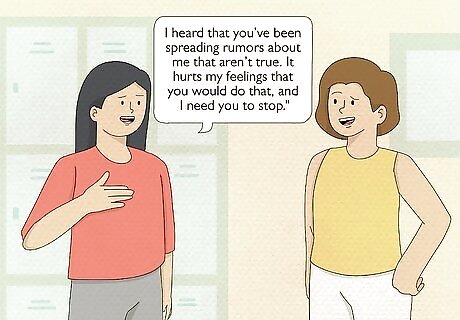
views
Responding to Bullying

Walk away if you can. If the bully is nearby, leave the situation right away. Don’t react, and don’t let them continue to talk to you. Go somewhere they won’t follow you. Get to a public place where others are present. Walking away is one of the best ways to defuse the bullying situation. For instance, if you’re being bullied at school, go and stand with your friends or return to your classroom. Don’t retreat to the bathroom by yourself, where the bully might follow you.

Stay calm. Avoid getting visibly upset, even if you feel angry or hurt. The bully wants to get a reaction from you, and if you raise your voice or cry, you’ll only encourage them to keep picking on you. Do your best to ignore the bullying by pretending not to hear or keeping a straight face and not even reacting to their taunting behaviors. The more reaction they will see coming from you, the more encouraging it is for them to keep bullying. Respond with one word, monotone answers. If someone makes up an elaborate insult and you just respond with "Cool" then it will make them look bad. Plus, it lets the bully know that you have tough skin and that they can't get to you just by saying a few words. Do not get into a physical fight with the bully, no matter how angry you are. You don’t want to be the one who gets in trouble.

Document any instances of bullying or rumor-spreading. Write down the date of any incidents, what happened, and who saw it happen. If someone is bullying you online, save any texts or screenshots that show what is going on.

Let your actions speak for you. Respond to rumors by keeping your chin up and working hard. Be polite and friendly to everyone you interact with. Do your best at work or in class. Nasty rumors may blow over by themselves if you make it obvious that they’re not rooted in reality.

Confide in a friend or family member. It can help you to talk to someone you trust when coping with bullying or rumors. Sharing your experience with a friend can help you feel better. Your loved one may also offer comfort and support during this challenging time. You might say, "This may come as a surprise, but I have been bullied. These kids at my school make up names and tease me."

Reach out for help. The only way bullying may stop is by going to a higher-up and informing them about the situation. If you are in school, it’s a good idea to let a parent, teacher, or coach know about the bullying. If you’re experiencing bullying in your workplace, consider talking to your supervisor or HR department about it. Show a trusted adult, your boss, or your HR department the evidence you’ve gathered. Stay professional and objective when you present your evidence.

Keep telling if no one takes action. In some cases, the person you go to for help may be biased or may choose not to take action. If you think your teacher, boss or HR department may side with the bully, tell someone who is impartial to the situation. Have them accompany you to the meeting as an advocate. Bring along any evidence you have. You may have to file a complaint against the person if they refuse to take action. This may involve contacting their boss, or writing a letter to a local activist group who can represent your interests.
Confronting a Bully

Think about what you want to say ahead of time. Don’t confront a bully in the heat of the moment. Take some time to consider what message you want to get across. You may want to ask a friend or a parent to help you decide what to say. Find a way to say something to the bully that feels right to you. Do not insult the other person in an act of revenge, and don’t argue with the bully as this feeds into their aggressive behavior. Whatever you say, be clear and direct. You might want to say something like, “I heard that you’ve been spreading rumors about me that aren’t true. It hurts my feelings that you would do that, and I need you to stop.”

Bring a friend. If you’re nervous about talking to the bully, ask a friend to come with you. They don’t have to say anything. It can be helpful just to have someone beside you when you stand up for yourself.

Act confident. Stand up straight and look the bully in the eye when you talk to them. Speak in a clear, firm voice. Avoid folding your arms, speaking too quickly, or tensing your muscles. Remain calm by taking several deep breaths in through your nose and out through your mouth. Silently repeat a mantra, like "You can do this." If you don’t feel confident, practice by looking in a mirror or role-playing with a friend.

Avoid starting a fight. Say what you need to say, and then leave. Don’t insult the bully or try to get back at them. If the bully tries to pick a fight with you, don’t take the bait – just walk away. Sometimes, being nice to a bully can catch them off guard. Using a friendly tone when you talk to the bully might work better than showing them you’re upset.
Staying Emotionally Strong

Recognize signs of bullying. Someone who is a bully may exhibit some of these behaviors toward you or others: forcing you to do something you would not normally do, or don’t want to do; hitting you, or using any other form of physically aggressive and abusive behavior; taking and breaking your property, such as a cell phone or toy; calling you names or using any other form of verbally aggressive behavior toward you.

Understand why people bully and spread rumors about others. Realize that bullying can come from many sources such as older siblings, a parental figure, friends, or even strangers who use aggression and intimidation to get their way. It’s possible that the bully has an undiagnosed or diagnosed learning or other disability which inhibits their ability to learn both social and problem-solving skills. Bullies also often have cognitive distortions, which means that they see their situations in such a way that they truly feel they can justify their bullying behavior, even if we can see that it is wrong. Bullies like to rebuild their internal sense of control that they may have felt was lost. When they feel powerless and afraid, they show it through aggressive behavior because that's what makes him feel more in control.

Know who your real friends are. A “friend” who talks about you behind your back isn’t a real friend. Spend your time with people who are loyal, honest, and caring, and don’t waste your time on the others. A true friend is someone who would stand up for you instead of believing a false rumor about you.

Avoid participating in gossip. Gossiping can feel fun, but it has the potential to hurt people. If you’ve been the subject of malicious gossip, use the experience to become more empathetic. Avoid talking about other people behind their backs, and if you hear other people gossiping, say something to shut it down. For instance, if two of your friends start gossiping about someone else, say something like, “Sarah has always been nice to me. I’d rather not talk about her while she isn’t here.”

Do things that make you feel good about yourself. Spend time developing your skills, taking care of your health, and trying new things. Learn to enjoy spending time by yourself as well as with other people. When you have healthy self-esteem, you’ll bounce back from bullying more easily.

















Comments
0 comment